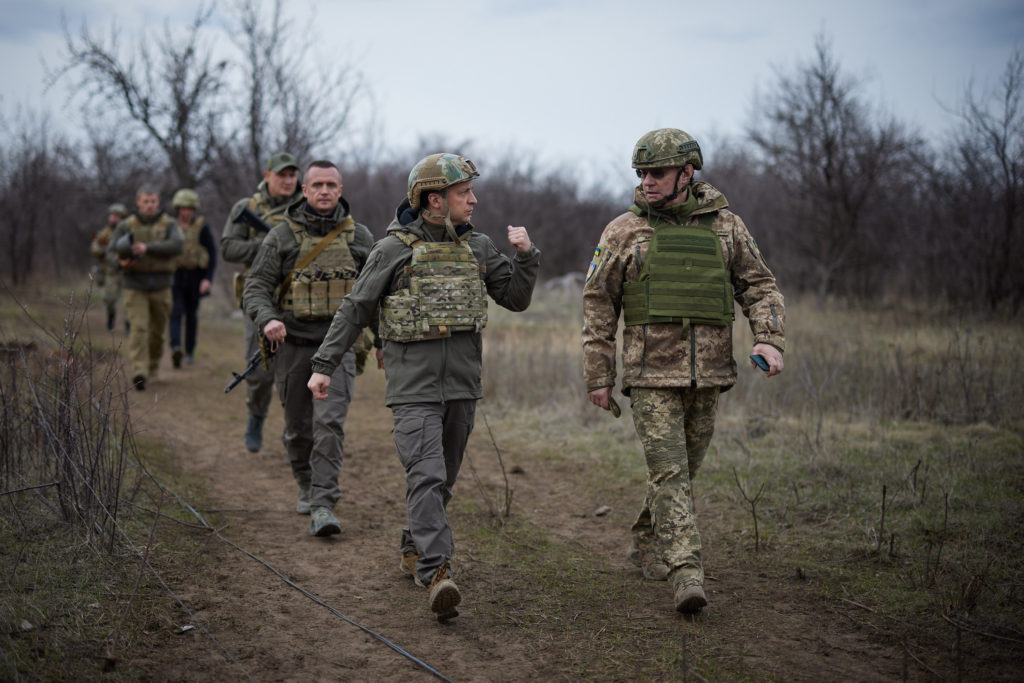Ukraine said on Monday that the Kremlin was not responding to its request from President Volodymyr Zelensky for talks on heightened tension along the neighbours’ border and suggested that Russia might be funnelling even more troops next to areas of the country held for seven years by separatists aligned with Moscow.
Western countries urged Moscow to take steps to ease the tension as U.S. Secretary of State Antony Blinken, in Brussels for talks, discussed developments in eastern Ukraine with the head of NATO.
Russian President Dmitry Peskov said he was unaware of any request from Ukraine for talks. Russian officials have said Ukraine is in the grip of a civil war and any movements by Russian troops near Ukraine were Moscow’s own business, routine, and no cause for anyone’s concern. About 14,000 have died in the conflict since the separatist takeover and Russia’s annexation of Crimea in 2014.
Zelensky’s press secretary, Iulia Mendl, said the Ukrainian president had requested a conversation with Putin on 26th March, when four Ukrainian servicemen were killed in a new upsurge of violence adjacent to the separatist-held territories.
“The president’s office, of course, made a request to speak with Vladimir Putin. We have not received an answer yet and we very much hope that this is not a refusal of dialogue,”Mendel said.
She said Russia had more than 40,000 troops deployed on Ukraine’s eastern border and more than 40,000 troops in Crimea. Some 50,000 of all those soldiers were new deployments.
Binken had warned at the weekend that he was concerned about the Russian deployment and warned of “real consequences” if Russia behaved “recklessly or aggressively”.
On Monday, the State Department said he and NATO Secretary Jens Stoltenberg discussed the “immediate need for Russia to cease its aggressive military buildup” during a telephone conversation.
Foreign ministers from the G7 group of industrialised nations, in a statement released by the British foreign office, denounced the troop movements, saying they “represent threatening and destabilizing activities”.
Western countries at the weekend condemned Russia’s failure to attend a meeting in Vienna of the Organisation for Cooperation and Security in Europe intended to calm the situation on the border.
A senior Ukrainian official was quoted as saying that intelligence reports suggested that Russia was planning to double its presence in the border region.
Roman Mashovets, speaking to Ukrainian media after discussing the situation with the Swedish ambassador, pointed to Russian troops movements “as a result of which, their number could well double”
“If Russia rejects reasonable decisions on this, we will clearly see, along with the international community, who is responsible for destabilising the situation,” Mashovets, deputy head of Zelensky’s office, was quoted as saying.
Russian officials have said they are acting in anticipation of what they see as Ukrainian offensive actions around the two “people’s republics” proclaimed by separatists and have told Kyiv to talk to the separatist leaders.
Putin has said he will not “remain indifferent” to the interests of Russian-speakers in the region — an explanation often used for Russian intervention in other statelets in territory no longer under Moscow’s control, like in Georgia.
Foreign Minister Sergei Lavrov, quoted by Russia Today television, said that after the 2014 “Revolution of Dignity” mass protests that forced from power a Russia-friendly president, “Kyiv attacked its people and since then has been waging a war with its own people, declaring them terrorists. Although the residents of Donbass did not attack anyone in the rest of Ukraine”.
Zelensky has toughened his position after coming to power in 2019 on pledges that he could halt the fighting “by just stopping the shooting”. He made a symbolic visit last week to the front lines of areas in eastern Ukraine which have remained under government control. About 7 percent of two eastern regions are in separatist hands.

